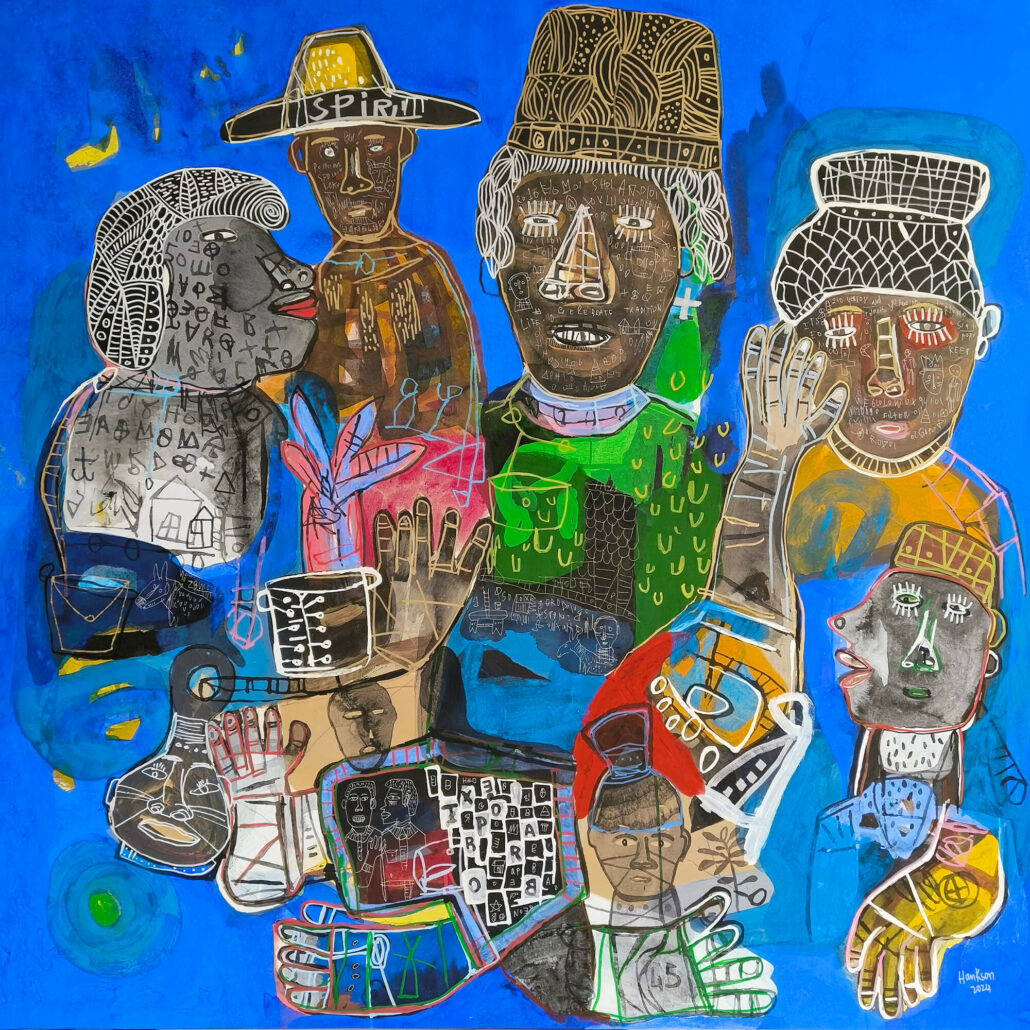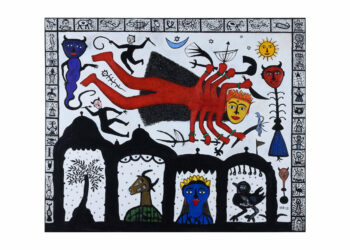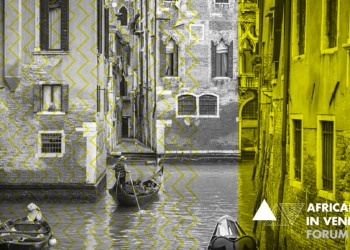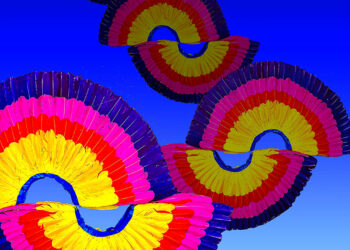After its debut in 2022, the Republic of Cameroon returns to the spotlight at the 60th International Art Exhibition – La Biennale di Venezia, with the project “Nemo propheta in patria,” which invites 5 Cameroonian artists and 8 international artists from Italy, Germany, the Netherlands, France, Colombia, and China.

Hako Hankson, Days of celebration. Acrylic and Indian Ink on canvas, 200 x 200cm. Courtesy of the artist & Primo Marella Gallery
The local artists include Jean Michel Dissake, Hako Hankson, Kendji & Ollo Arts, Patrick-Joël Tatcheda Yonkeu, Guy Wouete, while the international lineup features Angelo Accardi, Julia Bornefeld, Cesare Catania, Adélaïde Laurent-Bellue, Franco Mazzucchelli, Rex and Edna Volcan, Giorgio Tentolini, and Liu Youju.
The Pavilion is hosted at Palazzo Donà dalle Rose, which has been the venue for National Pavilions of the Biennale for years, thanks to the spouses Francesco and Chiara Donà dalle Rose and their eponymous private foundation.
After bringing the first official NFT exhibition to the Biennale in 2022, the Pavilion of the Republic of Cameroon is the first to realise a Carbon Net Zero exhibition, acting in two complementary directions: policies for reducing emissions and reusing materials will be implemented, and at the end of the exhibition, all aspects related to the exhibition will be measured using GHG standards to calculate the CO2 emissions emitted and offset them by planting certified trees to create a new forest in Cameroon.
Inspired by the Biennale’s theme “Strangers Everywhere,” the exhibition project led by commissioner Serge Achille Ndouma and curators Paul Emmanuel Loga Mahop and Sandro Orlandi Stagl delves into a theme that finds diffusion everywhere and characterises every era. The Latin saying “Nemo propheta in patria” (No one is a prophet in their land) highlights the circumstance that rarely does a person enjoy prestige and recognition in the place where they were born and where everyone knows them. On the contrary, it is more likely to happen elsewhere, among strangers. In this context, a prophet is simply a person misunderstood by their contemporaries and compatriots because of their dissonant nature. This figure stands out for something, not necessarily at extreme levels or of genius, but for their ability to see beyond, to see what others do not see, to anticipate the times, and to think differently from the masses. It is for this reason that they are often misunderstood, especially in their community of origin, where there is a greater expectation of conformity to the “norms” of the group.
There are numerous historical cases in which enlightened individuals have had to change countries due to opposition to their ideas or beliefs or have only been recognised after death. Art has always been at the forefront of overcoming discrimination and spreading ideas in every social and geographical context.
In summary, the Latin saying reflects a universal truth about the difficulty many innovators face in being appreciated and understood in their native environment, where expectations of conformity often prevail.
As part of a Biennale dedicated to foreigners and their diasporas, the National Pavilion of the Republic of Cameroon brings to international attention some Cameroonian and international artists, outside their native context but involved in a project of broad views. The project celebrates in general those who have had to leave their community in search of work, attention, and perhaps success elsewhere. Millions of migrants have faced this situation in all epochs, and it can be said that no nation has been spared, either for fuelling this phenomenon or for suffering from it.
The Pavilion of the Republic of Cameroon presents itself as the “pavilion of wonders,” where projects by local and international artists come together to celebrate the courage of those who have never abandoned their ideas, regardless of the recognition obtained locally, ambitiously looking towards a deserved international horizon. A Pavilion where differences are considered wealth and where no one feels like a “stranger.”
During the opening period, the Pavilion of the Republic of Cameroon, together with the Donà dalle Rose Foundation, will organise numerous events that will see the participation of international artists including the Cypriot Alexandros Yorkadjis, the Scandinavian Sonia Cristoph, the English Tony d’Amico and the American David Sirota, as well as the all-Italian voices of Alice Valenti, Marzia Ratti, David Berkovitz and Gianluca Balocco. It’s a program of events with a high cultural impact, which promises to be full of surprises and emotions.
The Pavilion is made possible thanks to the support of the Donà dalle Rose Foundation, BIAS Institute, The Doge Venice Red Carpet, Cometh, and in collaboration with Massimo Scaringella.



